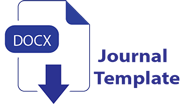Sensemaking of Stakeholder Identity Construction in Determining Potential Social Assistance Recipients
Abstract
Implementation of the social assistance policy program to determine social assistance recipients in the context of development communication involves stakeholder action in the sensemaking process as an effort to achieve a common understanding in determining who is worthy of receiving social assistance. Previous research stated that the problems that still occur today are weak communication and coordination between institutions, distribution of social assistance that does not match targets, unclear distribution mechanisms and data on social assistance recipients that are not in sync, lack of integration of one Indonesian data, misidentification, and neglect of groups. vulnerable, deceased social assistance recipients are still registered, identity of social assistance recipients is not registered in DTKS or SIKS-NG, problematic social assistance recipients are still registered, NIK is invalid, inactive social assistance recipients still receive assistance, multiple social assistance recipients. The aim of this research is to understand the sensemaking process used by stakeholders in determining potential social assistance recipients. The approach used in this research is descriptive qualitative using a constructivist paradigm and case study design. The research results show the important role of identity construction of local leaders, especially village heads, in data management and distribution of social assistance. Through a reflective and participatory approach, local leaders can ensure the accuracy and honesty of data on social assistance recipients, as well as increase the overall effectiveness of the social assistance program. The results of this research offer a new approach in determining social assistance recipients called sensemaking.
Keywords: Development communication, identity construction, sensemaking
ABSTRAK
Pelaksanaan program kebijakan bantuan sosial untuk menentukan penerima bansos dalam konteks komunikasi pembangunan melibatkan tindakan pemangku kepentingan pada proses sensemaking sebagai upaya mencapai pemahaman bersama dalam menentukan siapa yang layak penerima bansos. Penelitian sebelumnya menyatakan, permasalahan yang masih terjadi hingga saat ini adalah lemahnya komunikasi dan koordinasi antar lembaga, penyaluran bansos yang tidak sesuai target sasaran, ketidakjelasan mekanisme penyaluran dan data penerima bansos yang tidak sinkron, kurangnya integrasi satu data indonesia, kesalahan identifikasi dan pengabaian terhadap kelompok rentan, penerima bansos meninggal masih terdaftar, identitas penerima bansos tidak terdaftar dalam DTKS atau SIKS-NG, penerima bansos bermasalah tetap terdaftar, NIK tidak valid, penerima bansos tidak aktif tetap menerima bantuan, penerima bansos ganda. Adapun tujuan dari penelitian ini adalah untuk memahami proses sensemaking yang digunakan pemangku kepentingan dalam menentukan calon penerima bansos. Pendekatan yang digunakan dalam penelitian ini adalah deskriptif kualitatif dengan menggunakan paradigma konstruktivis dan desain studi kasus. Hasil penelitian menunjukkan, pentingnya peran konstruksi identitas pemimpin lokal, terutama kepala desa, dalam tata kelola data dan penyaluran bansos. Melalui pendekatan reflektif dan partisipatif, pemimpin lokal dapat memastikan keakuratan dan kejujuran data penerima bansos, serta meningkatkan efektivitas program bansos secara keseluruhan. Hasil penelitian ini menawarkan pendekatan baru dalam penentuan penerima bansos yang disebut sensemaking.
Kata Kunci: Komunikasi pembangunan, konstruksi identitas, sensemaking
Full Text:
PDFReferences
Ancona, D. (2012). Sensemaking: Framing and Acting in the Unknown. The Handbook for Teaching Leadership: Knowing, Doing, and Being, 3–19.
Ashforth, B. E., & Schinoff, B. S. (2016). Identity under Construction: How Individuals Come to Define Themselves in Organizations. Annual Review of Organizational Psychology and Organizational Behavior, 3(April 2016), 111–137. https://doi.org/10.1146/annurev-orgpsych-041015-062322
Brennan, M. (2023). Importance of Incorporating Local Culture into Community Development. The Pennsylvania State University.
Creswell, J. W., & David Creswell, J. (2018). Research Design: Qualitative, Quantitative, and Mixed Methods Approaches. Research Design Fifth Edition.
Darmastuti, R., Prasetya, B. E. A., & P, T. A. S. (2020). The Identity Construction of Solo’s Adolescent regarding “Narimo Ing Pandum.” Jurnal ASPIKOM, 5(2), 352. https://doi.org/10.24329/aspikom.v5i2.687
Gregory, K., & Koesten, L. (2022). Human-Centered Data Discovery (G. Marchionini (ed.)). Springer Nature Switzerland AG. https://doi.org/https://doi.org/10.1007/978-3-031-18223-5_2
Howlett, M., & Cashore, B. (2014). Conceptualizing Public Policy. Comparative Policy Studies, 17–33. https://doi.org/10.1057/9781137314154_2
Kusumaputra, A. (2021). Simplifikasi Birokrasi Penyaluran Bantuan Sosial Dalam Situasi Darurat Pandemi Covid-19 Melalui Transformasi Legal-Digital. Prosiding Seminar Nasional Penanggulangan Kemiskinan, 1(1), 230–247. https://conference.trunojoyo.ac.id/pub/index.php/semnaspk/article/view/49%0Ahttps://conference.trunojoyo.ac.id/pub/index.php/semnaspk/article/viewFile/49/55
Morgan, D. L. (2014). Pragmatism as a Paradigm for Social Research. Qualitative Inquiry, 20(8), 1045–1053. https://doi.org/10.1177/1077800413513733
Muers, S. (2018). Culture, Values and Public Policy. Institute for Policy Research, September, 1–31. https://www.bath.ac.uk/publications/culture-values-and-public-policy/attachments/CultureValuesandPublicPolicy.pdf
Purnama, N. A. (2022). Bansos Tidak Tepat Sasaran Adalah Maladministrasi. https://www.ombudsman.go.id/perwakilan/news/r/pwkinternal—bansos-tidak-tepat-sasaran-adalah-maladministrasi#:~:text=Disebutkan dalam Pasal 11 Peraturan Ombudsman Nomor 48, layanan publik yang tidak sesuai dengan alur%2Fprosedur layanan.
Ramly, R. Y., & Budiawan, S. (2021). Analisis Sistem Penyaluran Dana Bantuan Sosial Akibat Corona Virus Desease (Covid-19) Di Provinsi Gorontalo. YUME: Journal of Management, 4(3), 157–164. https://doi.org/10.37531/yume.vxix.432
Rogers, E. M. (1983). Diffusion Of Innovations. Third Edition. The Free Press. A Division of Macmillan Publishing Co., Inc.
Servaes, J. (2020). Handbook of communication for development and social change. In Springer Nature Singapore Pte Ltd. https://doi.org/10.1007/978-981-15-2014-3
Sjaf, Sofyan, et al. (2020). Data Desa Presisi. Lembaga Penelitian Dan Pengabdian Kepada Masyarakat (LPPM) IPB University. IPB Press.
Stig Ole Johnsen, T. P. (2021). Sensemaking in Safety Critical and Complex Situations Human Factors and Design. Taylor & Francis Group.
Teja, M. (2020). Permasalahan Keakuratan Data Penerima Bantuan Sosial Covid-19 (Issues of Accuracy of Recipients of COVID-19 Social Assistance). Info Singkat: Kajian Singkat Terhadap Isu Aktual Dan Strategis, Vol. XII, 13–18. http://berkas.dpr.go.id/puslit/files/info_singkat/Info Singkat-XII-18-II-P3DI-September-2020-242.pdf
Wahyuni, D. (2021). Permasalahan Penyaluran Bantuan Sosial dalam Masa Pemberlakuan Pembatasan Kegiatan Masyarakat. Bidang Kesejahteraan Sosial, XII, 13–18.
Weick, K. E. (1995). Sensemaking in Organizations. In SAGE Publications, Inc.
Yin, R. K. (2018). Case Study Research and Applications Design and Methods Sixth Edition.
DOI: http://dx.doi.org/10.31000/nyimak.v8i1.10608
Article Metrics
Abstract - 693 PDF - 596Refbacks
- There are currently no refbacks.

This work is licensed under a Creative Commons Attribution-ShareAlike 4.0 International License.
Nyimak : Journal of Communication
Communication Science Study Program, Faculty of Social and Political Sciences, Universitas Muhammadiyah Tangerang.
Jl.Mayjen Sutoyo No.2 Kota Tangerang, West Java. Provinsi Banten 15111 Indonesia.
nyimak_journal@umt.ac.id
journalnyimak@gmail.com
Nyimak: Journal of Communication already indexed by:
Nyimak: Journal of Communication is licensed under a Creative Commons Attribution-ShareAlike 4.0 International License.

.png)









